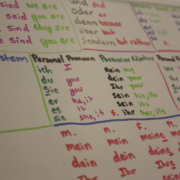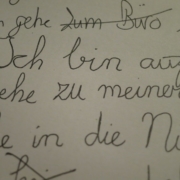Today we would like to talk about a very special book, How to be German (in 50 easy steps). It is an unpretentious manual whose intention is to transform the reader in a perfect teutonic mutant, with all the merits, tribulations and idiosyncrasies that derive from it. Supported by ironic illustrations for each step it is written in German and English.
The approach is utterly ironic and amusing, and the 50 steps to follow span from the Apfelsaftschorle to German bureaucracy, to the much-hated GEMA to living bio, the fines on public transport, all the way to the beloved Kartoffelsalat. It also talks about the sacredness of Tatort on Sunday evenings and the importance of greeting cards for any special occasion. A spiritual compilation that has cheered my first U-Bahn trips and most often ripped me off in laughter in the religious silence that reigns on wagons, stirring up the discreet curiosity of my taciturn traveling companions who, after having looked at the title in cover, understood the reason of so much hilarity and would often exchange a smile.
The author, Adam Fletcher, is a Cambridge blogger and marketing expert who has been in Berlin for some years now; on his official page he describes himself as “a writer, an amateur chocolate eater and a professional napper,” as well as author of three enjoyable volumes such as “A Picnic for Perverts” (2012), “The Hipster Guide” (2013) and “Denglish for Better Knowers” (2014). After the tragicomic closing of Neukölln’s Hipstery store, Adam continues to write his satirical pieces and sell his line of gadgets through e-commerce, narrowing the target and type of products that he and his partner smuggle under a single, exhaustive label: “things that make us laugh.” The kit of the perfect Berliner hipster is one of the most genius and hilarious finds I have ever found. Take a look at yourself, if you do not believe it.

15. «MAHLZEIT!»
German has the reputation of being a pragmatic and literal language. Both nouns – like the nipple, for example, that was renamed with the romantic Brustwarze (“wart on the chest”), and the too explicit Antibabypille – and some of its expressions, which sometimes seem to describe not a mood or a state of mind, but the mysterious mechanics of an invisible car: “Es mennuft” (“works”), “Es geht” (“goes”), “Es passt” (“its fits good, it adapts”) , “Alles in Ordnung” (“all in place”).
This can serve as an appetizer, intrepid Ausländers, but to become real Germans you must learn to use the most pragmatic and disconcerting greeting of all – “Mahlzeit!”, Translated with “have a good meal!” or more literally with “meal time”. I had just arrived in Germany and while I was sitting in the canteen for lunch, my colleagues walked by the door and said to me, “Mahlzeit! ». Mahlzeit? Mahlzeit? Lunch time? Well, no doubt! That I’m eating is obvious. Right now I am clearly and loudly swirling a potato salad. I’m chewing, don’t you see? I know it’s a bit early for lunch, but I admit I missed breakfast. Do not judge me, have pity, please!
Only then do you understand that it is not a question. It’s a redundant, clumsy disguised statement, like a kid playing and stealing clothes from its parents, a form of greeting. So, for the sake of integration, over time you will start using it too. At first, it will sound a little bit weird, but I assure you that after a while you will find it rather fun, especially since in many regions of Germany you can use it at any time of the day. You can call someone at 4 am when you know for sure that they are still sleeping and wish them “Mahlzeit!” Brilliant. Perhaps you are wondering why you can’t add the -zeit suffix to other activities to create new and original greetings. But German literacy begins and ends just when you start to grasp its meaning. Glove is Handschuh (“hand shoe”), but do not dream of calling the Kopfschuh hat (“head shoe”). Do you see someone drinking? You can not wish him “Trinkzeit!”. You neighbours are having sex and don’t even bother covering up the moans? It is not admissible to ring the bell and wish them a warm ‘Fickzeit!’
Only «Mahlzeit», understood?
(Adam Fletcher and Ingo Herze, How to be a German/ Wie man Deutscher wird, Verlag C.H.Beck oHG, München 2013, pp.23-24)
Want to learn German in a vibrant environment? Look no further and check out the German courses that Berlino Schule organizes by clicking here!

















